安卓 dex 通用脱壳技术研究
来源:互联网 发布:张伯伦场均数据 编辑:程序博客网 时间:2024/05/17 09:35
0x01 背景介绍
安卓 APP 的保护一般分为下列几个方面:
JAVA/C代码混淆
dex文件加壳
.so文件加壳
反动态调试技术
其中混淆和加壳是为了防止对应用的静态分析;代码混淆会增加攻击者的时间成本, 但并不能从根本上解决应用被逆向的问题;而加壳技术一旦被破解,其优势更是荡然无存;反调试用来对抗对APP的动态分析;
昨天看雪zyqqyz同学发了一个Android应用程序通用自动脱壳方法:DexHunter,详见Github;通过定制Dalvik虚拟机实现,并对目前国内6款主流加固产品的进行了测试,效果良好;下面我们会讲解Dalvik解释器实现原理,并分析DexHunter代码实现;
目前来看,要对抗这种脱壳方法,最好的办法应该是APP启动时hook被修改的几处函数,并还原之;对开发者来说,应当将涉及资产、创新的关键代码放入Native层实现,并通过.so加壳和反调试进行保护;
上次与梆梆的交流,他们提到梆梆3.0正在研发类似PC上的VMP保护壳技术,实现APK保护;但个人认为要在兼容性方面做的工作实在太多,短时间内估计很难实现了;
下面开始,分3个方面介绍通过定制Dalvik的通用脱壳方案:1.Dalvik 解释器原理分析,2.DexHunter代码分析,3.测试
0x02 Dalvik 解释器原理分析
解释器是Dalvik虚拟机的执行引擎,它负责解释执行Dalvik字节码。在字节码加载完毕后,Dalvik虚拟机调用解释器开始取指解释字节码,解释器跳转到解释程序处执行。目前安卓解释器有两种,Portable和Fast解释器,分别使用C和汇编实现;优势分别是兼容性和性能,具体使用哪个可以自己来指定,因此本着简单的原则,我们分析并使用Portable解释器;
获取字节码并分析与解释执行是Dalvik虚拟机解释器的主要工作。Dalvik虚拟机的入口函数是vm/interp下的dvmInterpret函数;外部通过调用dvmInterpret函数进入解释器执行,其流程为dvmCallMethod->dvmCallMethodV->dvmInterpret。
在外部函数调用解释器以后,解释器执行的主要流程有以下几个步骤。
初始化解释器执行环境
根据系统参数,选择使用Portable或Fast解释器
跳转到相应解释器执行
取指及指令检查
执行字节码对应程序段
dvmInterpret函数作为解释器的入口函数,主要完成整个流程的前三部分,执行流程如下:
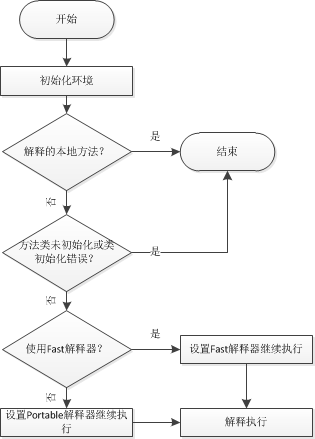
由于前三部分与我们定制Dalvik无关,这里不做详细介绍;
根据解释器的功能,可以想像的到,最简单的模型就是一个大的switch语句,对每条指令进行判断,然后case到相应的代码进行解释,解释完成后又回到switch顶部,如下:
while (insn) { switch (insn) { case NOP: break; case MOV: do something; break; ... case OP: do something; break; default: break; } 取指;}然而当解释完成一条指令后,再重新判断指令类型是个昂贵的开销。因为对于每条指令,都将从switch顶部开始判断,也就是从NOP指令开始判断,直到找到相应的指令为止,这使得解释器的执行效率十分低下。
这类问题的解决方法就是空间换时间,Dalvik就采用了这个思路;它为每条指令分配一个对应的标签(Label),标签标示的是该指令解释程序的开始,每条指令的解释程序末尾,有取指动作,可以取下一条要执行指令;Dalvik具体使用GCC的Threaded Code技术来实现,它使用了一个静态的标签数组,用来存储各个字节码解释程序对应的标签地址,其具体以一个宏来定义:
dalvik/libdex/DexOpcodes.h
/* * Macro used to generate a computed goto table for use in implementing * an interpreter in C. */#define DEFINE_GOTO_TABLE(_name) \ static const void* _name[kNumPackedOpcodes] = { \ /* BEGIN(libdex-goto-table); GENERATED AUTOMATICALLY BY opcode-gen */ \ H(OP_NOP), \ H(OP_MOVE), \ H(OP_MOVE_FROM16), \ H(OP_MOVE_16), \ H(OP_MOVE_WIDE), \ ... }下面看下H宏实现:
#define H(_op) &&op_##_op那如何根据指令得到相应的Label地址呢?Dalvik中使用了索引号:
enum Opcode { // BEGIN(libdex-opcode-enum); GENERATED AUTOMATICALLY BY opcode-gen OP_NOP = 0x00, OP_MOVE = 0x01, OP_MOVE_FROM16 = 0x02, OP_MOVE_16 = 0x03, OP_MOVE_WIDE = 0x04, OP_MOVE_WIDE_FROM16 = 0x05, OP_MOVE_WIDE_16 = 0x06, OP_MOVE_OBJECT = 0x07, ....}因此整个执行流程就是:取指令->取索引号->取Label得到解释程序地址->执行指令,并取下一条指令。
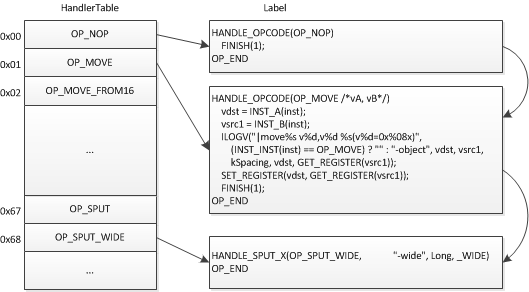
上面分析了解释器的基本模型,下面看Dalvik Portable的执行流程。其解析流程如图:
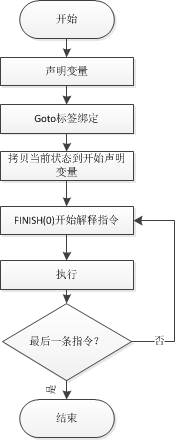
首先进行相关变量的声明,保存当前正在解释的方法curMethod、程序计数器pc、栈桢指针fp、当前指令inst、指令译码的相关部分包括保存寄存器值vsrc1,vsrc2,vdst、设置方法调用指针methodToCall等。
通过DEFINE_GOTO_TABLE(handlerTable)宏进行GOTO Label的绑定,获取并拷贝self->interpSave里保存的当前状态,包括方法method、程序计数器pc、堆栈帧curFrame、返回值retval、要分析的Dex文件的类对象信息curMethod->clazz->pDvmDex等已声明的变量。其代码如下:
dalvik/vm/mterp/out/InterpC-portable.cpp
/* copy state in */ curMethod = self->interpSave.method; pc = self->interpSave.pc; fp = self->interpSave.curFrame; retval = self->interpSave.retval; /* only need for kInterpEntryReturn? */ methodClassDex = curMethod->clazz->pDvmDex;最后通过FINISH(0)来取得第一条指令开始执行字节码解析。
在Dalvik Portable中,解释程序是由一系列宏控制,以对应的Label来表示,以NOP操作为例,其定义如下:
dalvik/vm/mterp/out/InterpC-portable.cpp
/*--- start of opcodes ---*//* File: c/OP_NOP.cpp */HANDLE_OPCODE(OP_NOP) FINISH(1);OP_END/* File: c/OP_MOVE.cpp */HANDLE_OPCODE(OP_MOVE /*vA, vB*/) vdst = INST_A(inst); vsrc1 = INST_B(inst); ILOGV("|move%s v%d,v%d %s(v%d=0x%08x)", (INST_INST(inst) == OP_MOVE) ? "" : "-object", vdst, vsrc1, kSpacing, vdst, GET_REGISTER(vsrc1)); SET_REGISTER(vdst, GET_REGISTER(vsrc1)); FINISH(1);OP_END/* File: c/OP_MOVE_FROM16.cpp */HANDLE_OPCODE(OP_MOVE_FROM16 /*vAA, vBBBB*/) vdst = INST_AA(inst); vsrc1 = FETCH(1); ILOGV("|move%s/from16 v%d,v%d %s(v%d=0x%08x)", (INST_INST(inst) == OP_MOVE_FROM16) ? "" : "-object", vdst, vsrc1, kSpacing, vdst, GET_REGISTER(vsrc1)); SET_REGISTER(vdst, GET_REGISTER(vsrc1)); FINISH(2);OP_ENDHANDLE_OPCODE(OP_NOP)表示对应的是OP_NOP操作,紧接其后的是解释程序的具体实现。到OP_END结束。而在Portable中,所以有解释程序都由C语言编写。NOP操作中的HANDLE_OPCODE、FINISH和OP_END都是宏定义。其中HANDLE_OPCODE和OP_END是成对出现的,OP_END什么也不做:
#define OP_END所以
HANDLE_OPCODE(OP_NOP) FINISH(1);OP_END可以翻译为:
op_OP_NOP: FINISH(1);对于NOP指令,其完成的工作就是什么也不做。因此,对应的解释程序就是直接取下一条将要执行的指令,也就是FINISH(1)所完成的工作。在FINISH()宏里,虚拟机获取下一条指令,并从指令中提取操作码号,根据该操作码号到指令解释程序查找表中得到相应的标签,然后跳转到该处理程序执行。其定义如下:
# define FINISH(_offset) { \ ADJUST_PC(_offset); \ inst = FETCH(0); \ if (self->interpBreak.ctl.subMode) { \ dvmCheckBefore(pc, fp, self); \ } \ goto *handlerTable[INST_INST(inst)]; \ }0x03 DexHunter代码分析
DexHunter 实现中,只需要修改一处文件:dalvik\vm\native\dalvik_system_DexFile.cpp
下面是BeyondCompare比对:
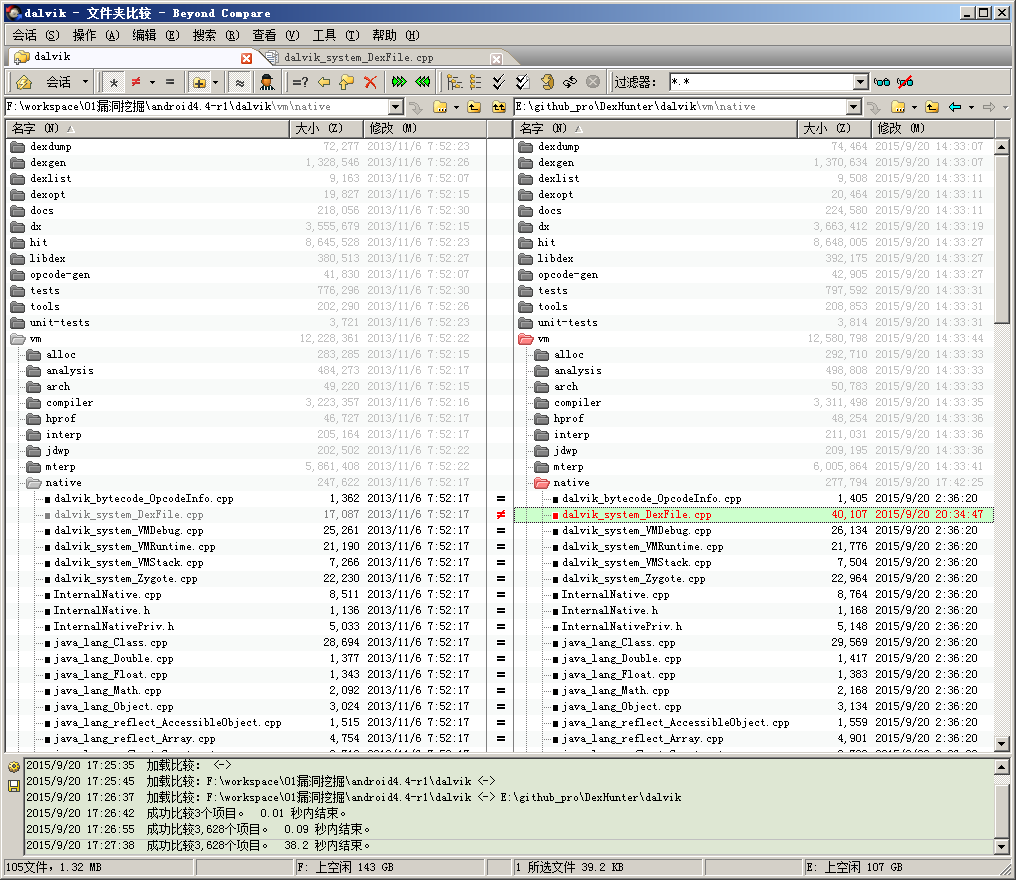
首先看一下DexHunter的设计原理:
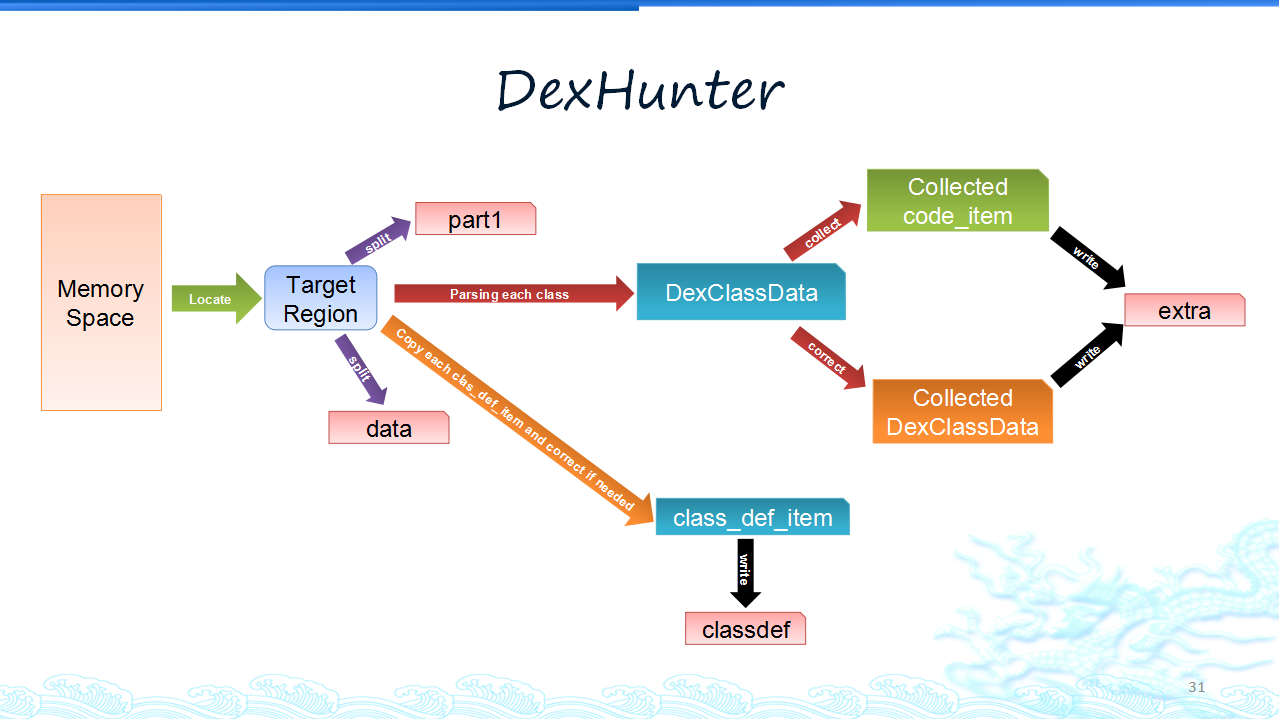
APP 启动时,通过freature string定位dex在内存中位置,并读取classdef块之前的内存为part1,读取classdef之后的内存为data。遍历class_def_item结构,生成文件classdef,并通过code_item_off判断具体的类方法是否在dex范围内,若不在,则写extra文件。

描述几个问题:
从哪里dump出dex文件
dex文件打开时
类加载时
类初始化时
类方法调用时
DexHunter中,我们关注,ClassLoader.loadClass->Dalvik_dalvik_system_DexFile_defineClassNative这个函数,它实现了类的加载,实现过程如下:

选择脱壳的时机应是在APP的第一个类加载的时候,为什么呢?
类加载之前,类的内容是在内存当中的
当类初始化时,该内存的内容可能会被动态修改
在一个类方法被调用前,code_item或指令肯定是可用的
那如何做呢?
我们要主动加载并初始化所有的类;
因此,我们代码的注入点,应该是Dalvik_dalvik_system_DexFile_defineClassNative()函数的clazz = dvmDefineClass(pDvmDex, descriptor, loader);语句之前;即在APP加载第一个类之前完成;通过dvmDefineClass主动遍历class_def_item加载每个类,并调用dvmIsClassInitialized和dvmInitClass函数初始化之。
初始化完成之后,内存中的就是将执行的代码,像梆梆加固针对每个方法进行的加密,会在运行时解密、运行完成后清理内存并再次加密,通过这种方法就可以过掉;因为我们模拟了这样一次调用过程;
下面是我加入注释的代码:
//------------------------added begin----------------------//#include <asm/siginfo.h>#include "libdex/DexClass.h"#include <sys/stat.h>#include <fcntl.h>#include <sys/mman.h>static char dexname[100]={0}; //feature stringstatic char dumppath[100]={0}; //dump的文件路径static bool readable=true;static pthread_mutex_t read_mutex;static bool flag=true;static pthread_mutex_t mutex;static bool timer_flag=true;static timer_t timerId;struct arg{ DvmDex* pDvmDex; Object * loader;}param;void timer_thread(sigval_t){ timer_flag=false; timer_delete(timerId); ALOGI("GOT IT time up");}void* ReadThread(void *arg){ FILE *fp = NULL; while (dexname[0]==0||dumppath[0]==0) { fp=fopen("/data/dexname", "r"); if (fp==NULL) { sleep(1); continue; } fgets(dexname,99,fp); //读feature string dexname[strlen(dexname)-1]=0; fgets(dumppath,99,fp); dumppath[strlen(dumppath)-1]=0;//取dump路径 fclose(fp); fp=NULL; } struct sigevent sev; sev.sigev_notify=SIGEV_THREAD; sev.sigev_value.sival_ptr=&timerId; sev.sigev_notify_function=timer_thread; sev.sigev_notify_attributes = NULL; timer_create(CLOCK_REALTIME,&sev,&timerId); struct itimerspec ts; ts.it_value.tv_sec=5; ts.it_value.tv_nsec=0; ts.it_interval.tv_sec=0; ts.it_interval.tv_nsec=0; timer_settime(timerId,0,&ts,NULL); return NULL;}/* 这里是class_data_item的前4项,称为ClassDataHeader Dex File->class_defs->class_def_item(class_data_offset)->class_data_item->ClassDataHeader */void ReadClassDataHeader(const uint8_t** pData, DexClassDataHeader *pHeader) { pHeader->staticFieldsSize = readUnsignedLeb128(pData); pHeader->instanceFieldsSize = readUnsignedLeb128(pData); pHeader->directMethodsSize = readUnsignedLeb128(pData); pHeader->virtualMethodsSize = readUnsignedLeb128(pData);}/* 下面两个函数,分别读class_data_item Header下的内容,分Field和Method*/void ReadClassDataField(const uint8_t** pData, DexField* pField) { pField->fieldIdx = readUnsignedLeb128(pData); pField->accessFlags = readUnsignedLeb128(pData);}void ReadClassDataMethod(const uint8_t** pData, DexMethod* pMethod) { pMethod->methodIdx = readUnsignedLeb128(pData); pMethod->accessFlags = readUnsignedLeb128(pData); pMethod->codeOff = readUnsignedLeb128(pData);}/* 解析class_data_item结构,使用到上面3个函数,分别解析,Header、Field和Method部分*/DexClassData* ReadClassData(const uint8_t** pData) { DexClassDataHeader header; if (*pData == NULL) { return NULL; } //读取 class_data_item的Header ReadClassDataHeader(pData, &header); size_t resultSize = sizeof(DexClassData) + (header.staticFieldsSize * sizeof(DexField)) + (header.instanceFieldsSize * sizeof(DexField)) + (header.directMethodsSize * sizeof(DexMethod)) + (header.virtualMethodsSize * sizeof(DexMethod)); DexClassData* result = (DexClassData*) malloc(resultSize); //result指向class_data_item并返回 if (result == NULL) { return NULL; } uint8_t* ptr = ((uint8_t*) result) + sizeof(DexClassData); //指向class_data_item的staic_fields偏移 result->header = header; //以下依次读class_data_item的staticFields,instanceFields,directMethods和virtualMethods域大小————————begain if (header.staticFieldsSize != 0) { result->staticFields = (DexField*) ptr; ptr += header.staticFieldsSize * sizeof(DexField); } else { result->staticFields = NULL; } if (header.instanceFieldsSize != 0) { result->instanceFields = (DexField*) ptr; ptr += header.instanceFieldsSize * sizeof(DexField); } else { result->instanceFields = NULL; } if (header.directMethodsSize != 0) { result->directMethods = (DexMethod*) ptr; ptr += header.directMethodsSize * sizeof(DexMethod); } else { result->directMethods = NULL; } if (header.virtualMethodsSize != 0) { result->virtualMethods = (DexMethod*) ptr; } else { result->virtualMethods = NULL; } //以下依次读class_data_item的staticFields,instanceFields,directMethods和virtualMethods域大小————————end //以下依次读staticFields,instanceFields,directMethods,virtualMethods域内容————————begain for (uint32_t i = 0; i < header.staticFieldsSize; i++) { ReadClassDataField(pData, &result->staticFields[i]); } for (uint32_t i = 0; i < header.instanceFieldsSize; i++) { ReadClassDataField(pData, &result->instanceFields[i]); } for (uint32_t i = 0; i < header.directMethodsSize; i++) { ReadClassDataMethod(pData, &result->directMethods[i]); } for (uint32_t i = 0; i < header.virtualMethodsSize; i++) { ReadClassDataMethod(pData, &result->virtualMethods[i]); } //以下依次读staticFields,instanceFields,directMethods,virtualMethods域内容————————end return result;}/* class_data_item中的一些域是用LEB128算法编码的*/void writeLeb128(uint8_t ** ptr, uint32_t data){ while (true) { uint8_t out = data & 0x7f; if (out != data) { *(*ptr)++ = out | 0x80; data >>= 7; } else { *(*ptr)++ = out; break; } }}/* 此函数读取class_data_item,并将内容用writeLeb128转码后返回*/uint8_t* EncodeClassData(DexClassData *pData, int& len){ len=0; len+=unsignedLeb128Size(pData->header.staticFieldsSize); len+=unsignedLeb128Size(pData->header.instanceFieldsSize); len+=unsignedLeb128Size(pData->header.directMethodsSize); len+=unsignedLeb128Size(pData->header.virtualMethodsSize); if (pData->staticFields) { for (uint32_t i = 0; i < pData->header.staticFieldsSize; i++) { len+=unsignedLeb128Size(pData->staticFields[i].fieldIdx); len+=unsignedLeb128Size(pData->staticFields[i].accessFlags); } } if (pData->instanceFields) { for (uint32_t i = 0; i < pData->header.instanceFieldsSize; i++) { len+=unsignedLeb128Size(pData->instanceFields[i].fieldIdx); len+=unsignedLeb128Size(pData->instanceFields[i].accessFlags); } } if (pData->directMethods) { for (uint32_t i=0; i<pData->header.directMethodsSize; i++) { len+=unsignedLeb128Size(pData->directMethods[i].methodIdx); len+=unsignedLeb128Size(pData->directMethods[i].accessFlags); len+=unsignedLeb128Size(pData->directMethods[i].codeOff); } } if (pData->virtualMethods) { for (uint32_t i=0; i<pData->header.virtualMethodsSize; i++) { len+=unsignedLeb128Size(pData->virtualMethods[i].methodIdx); len+=unsignedLeb128Size(pData->virtualMethods[i].accessFlags); len+=unsignedLeb128Size(pData->virtualMethods[i].codeOff); } } uint8_t * store = (uint8_t *) malloc(len); if (!store) { return NULL; } uint8_t * result=store; writeLeb128(&store,pData->header.staticFieldsSize); writeLeb128(&store,pData->header.instanceFieldsSize); writeLeb128(&store,pData->header.directMethodsSize); writeLeb128(&store,pData->header.virtualMethodsSize); if (pData->staticFields) { for (uint32_t i = 0; i < pData->header.staticFieldsSize; i++) { writeLeb128(&store,pData->staticFields[i].fieldIdx); writeLeb128(&store,pData->staticFields[i].accessFlags); } } if (pData->instanceFields) { for (uint32_t i = 0; i < pData->header.instanceFieldsSize; i++) { writeLeb128(&store,pData->instanceFields[i].fieldIdx); writeLeb128(&store,pData->instanceFields[i].accessFlags); } } if (pData->directMethods) { for (uint32_t i=0; i<pData->header.directMethodsSize; i++) { writeLeb128(&store,pData->directMethods[i].methodIdx); writeLeb128(&store,pData->directMethods[i].accessFlags); writeLeb128(&store,pData->directMethods[i].codeOff); } } if (pData->virtualMethods) { for (uint32_t i=0; i<pData->header.virtualMethodsSize; i++) { writeLeb128(&store,pData->virtualMethods[i].methodIdx); writeLeb128(&store,pData->virtualMethods[i].accessFlags); writeLeb128(&store,pData->virtualMethods[i].codeOff); } } free(pData); return result;}uint8_t* codeitem_end(const u1** pData){ uint32_t num_of_list = readUnsignedLeb128(pData); for (;num_of_list>0;num_of_list--) { int32_t num_of_handlers=readSignedLeb128(pData); int num=num_of_handlers; if (num_of_handlers<=0) { num=-num_of_handlers; } for (; num > 0; num--) { readUnsignedLeb128(pData); readUnsignedLeb128(pData); } if (num_of_handlers<=0) { readUnsignedLeb128(pData); } } return (uint8_t*)(*pData);}/* 此为DexHunter实现的主要功能,进行内存dump,将class_def_items中dump出classdef和extra部分*/void* DumpClass(void *parament){ while (timer_flag) { sleep(5); } DvmDex* pDvmDex=((struct arg*)parament)->pDvmDex; //pDvmDex代表一个dex文件 Object *loader=((struct arg*)parament)->loader; DexFile* pDexFile=pDvmDex->pDexFile; MemMapping * mem=&pDvmDex->memMap; u4 time=dvmGetRelativeTimeMsec(); ALOGI("GOT IT begin: %d ms",time); char *path = new char[100]; strcpy(path,dumppath); strcat(path,"classdef"); //构造classdef文件路径 FILE *fp = fopen(path, "wb+"); strcpy(path,dumppath); strcat(path,"extra"); //构造extra文件路径 FILE *fp1 = fopen(path,"wb+"); uint32_t mask=0x3ffff; char padding=0; const char* header="Landroid"; unsigned int num_class_defs=pDexFile->pHeader->classDefsSize; //dex文件的Header域,class_defs_size,标示了class_def域有几个class_def_item uint32_t total_pointer = mem->length-uint32_t(pDexFile->baseAddr-(const u1*)mem->addr); uint32_t rec=total_pointer; while (total_pointer&3) { total_pointer++; } int inc=total_pointer-rec; uint32_t start = pDexFile->pHeader->classDefsOff+sizeof(DexClassDef)*num_class_defs; uint32_t end = (uint32_t)((const u1*)mem->addr+mem->length-pDexFile->baseAddr); for (size_t i=0;i<num_class_defs;i++) //遍历所有class_def_item { bool need_extra=false; ClassObject * clazz=NULL; const u1* data=NULL; DexClassData* pData = NULL; bool pass=false; const DexClassDef *pClassDef = dexGetClassDef(pDvmDex->pDexFile, i); const char *descriptor = dexGetClassDescriptor(pDvmDex->pDexFile,pClassDef); if(!strncmp(header,descriptor,8)||!pClassDef->classDataOff) { pass=true; goto classdef; } clazz = dvmDefineClass(pDvmDex, descriptor, loader); //First Step:class加载 if (!clazz) { continue; } ALOGI("GOT IT class: %s",descriptor); if (!dvmIsClassInitialized(clazz)) { //Second Step:class初始化,遍历所有类进行初始化 if(dvmInitClass(clazz)){ //与dvmIsClassInitialized()函数共同完成初始化 ALOGI("GOT IT init: %s",descriptor); } } if(pClassDef->classDataOff<start || pClassDef->classDataOff>end) { need_extra=true; //是不是需要extra这一块,当存在class_data_off不在dex范围内时,就需要 } data=dexGetClassData(pDexFile, pClassDef); pData = ReadClassData(&data); if (!pData) { continue; } if (pData->directMethods) { for (uint32_t i=0; i<pData->header.directMethodsSize; i++) { Method *method = &(clazz->directMethods[i]); uint32_t ac = (method->accessFlags) & mask; ALOGI("GOT IT direct method name %s.%s",descriptor,method->name); if (!method->insns||ac&ACC_NATIVE) { if (pData->directMethods[i].codeOff) { need_extra = true; pData->directMethods[i].accessFlags=ac; pData->directMethods[i].codeOff=0; } continue; } u4 codeitem_off = u4((const u1*)method->insns-16-pDexFile->baseAddr); if (ac != pData->directMethods[i].accessFlags) { ALOGI("GOT IT method ac"); need_extra=true; pData->directMethods[i].accessFlags=ac; } if (codeitem_off!=pData->directMethods[i].codeOff&&((codeitem_off>=start&&codeitem_off<=end)||codeitem_off==0)) { ALOGI("GOT IT method code"); need_extra=true; pData->directMethods[i].codeOff=codeitem_off; } if ((codeitem_off<start || codeitem_off>end) && codeitem_off!=0) { //如果code_item_off不在dex文件范围内,则写入extra; fp1为extra的句柄 //这里使用的是slider.pptx,中的第二种方案,见p42 need_extra=true; pData->directMethods[i].codeOff = total_pointer; DexCode *code = (DexCode*)((const u1*)method->insns-16); uint8_t *item=(uint8_t *) code; int code_item_len = 0; if (code->triesSize) { const u1 * handler_data = dexGetCatchHandlerData(code); const u1** phandler=(const u1**)&handler_data; uint8_t * tail=codeitem_end(phandler); code_item_len = (int)(tail-item); }else{ code_item_len = 16+code->insnsSize*2; } ALOGI("GOT IT method code changed"); fwrite(item,1,code_item_len,fp1); fflush(fp1); total_pointer+=code_item_len; while (total_pointer&3) { fwrite(&padding,1,1,fp1); fflush(fp1); total_pointer++; } } } } if (pData->virtualMethods) { for (uint32_t i=0; i<pData->header.virtualMethodsSize; i++) { Method *method = &(clazz->virtualMethods[i]); uint32_t ac = (method->accessFlags) & mask; ALOGI("GOT IT virtual method name %s.%s",descriptor,method->name); if (!method->insns||ac&ACC_NATIVE) { if (pData->virtualMethods[i].codeOff) { need_extra = true; pData->virtualMethods[i].accessFlags=ac; pData->virtualMethods[i].codeOff=0; } continue; } u4 codeitem_off = u4((const u1 *)method->insns - 16 - pDexFile->baseAddr); if (ac != pData->virtualMethods[i].accessFlags) { ALOGI("GOT IT method ac"); need_extra=true; pData->virtualMethods[i].accessFlags=ac; } if (codeitem_off!=pData->virtualMethods[i].codeOff&&((codeitem_off>=start&&codeitem_off<=end)||codeitem_off==0)) { ALOGI("GOT IT method code"); need_extra=true; pData->virtualMethods[i].codeOff=codeitem_off; } if ((codeitem_off<start || codeitem_off>end)&&codeitem_off!=0) { need_extra=true; pData->virtualMethods[i].codeOff = total_pointer; DexCode *code = (DexCode*)((const u1*)method->insns-16); uint8_t *item=(uint8_t *) code; int code_item_len = 0; if (code->triesSize) { const u1 *handler_data = dexGetCatchHandlerData(code); const u1** phandler=(const u1**)&handler_data; uint8_t * tail=codeitem_end(phandler); code_item_len = (int)(tail-item); }else{ code_item_len = 16+code->insnsSize*2; } ALOGI("GOT IT method code changed"); fwrite(item,1,code_item_len,fp1); fflush(fp1); total_pointer+=code_item_len; while (total_pointer&3) { fwrite(&padding,1,1,fp1); fflush(fp1); total_pointer++; } } } }classdef: DexClassDef temp=*pClassDef; uint8_t *p = (uint8_t *)&temp; if (need_extra) { ALOGI("GOT IT classdata before"); int class_data_len = 0; uint8_t *out = EncodeClassData(pData,class_data_len); if (!out) { continue; } temp.classDataOff = total_pointer; fwrite(out,1,class_data_len,fp1); fflush(fp1); total_pointer+=class_data_len; while (total_pointer&3) { fwrite(&padding,1,1,fp1); fflush(fp1); total_pointer++; } free(out); ALOGI("GOT IT classdata written"); }else{ if (pData) { free(pData); } } if (pass) { temp.classDataOff=0; temp.annotationsOff=0; } ALOGI("GOT IT classdef"); fwrite(p, sizeof(DexClassDef), 1, fp); fflush(fp); } fclose(fp1); fclose(fp); //目前已经准备好了part1,classdef,data和extra 4部分文件 strcpy(path,dumppath); strcat(path,"whole.dex"); //组合4部分,并写入whole.dex fp = fopen(path,"wb+"); rewind(fp); int fd=-1; int r=-1; int len=0; char *addr=NULL; struct stat st; strcpy(path,dumppath); strcat(path,"part1"); fd=open(path,O_RDONLY,0666); if (fd==-1) { return NULL; } r=fstat(fd,&st); if(r==-1){ close(fd); return NULL; } len=st.st_size; addr=(char*)mmap(NULL,len,PROT_READ,MAP_PRIVATE,fd,0); fwrite(addr,1,len,fp); fflush(fp); munmap(addr,len); close(fd); strcpy(path,dumppath); strcat(path,"classdef"); fd=open(path,O_RDONLY,0666); if (fd==-1) { return NULL; } r=fstat(fd,&st); if(r==-1){ close(fd); return NULL; } len=st.st_size; addr=(char*)mmap(NULL,len,PROT_READ,MAP_PRIVATE,fd,0); fwrite(addr,1,len,fp); fflush(fp); munmap(addr,len); close(fd); strcpy(path,dumppath); strcat(path,"data"); fd=open(path,O_RDONLY,0666); if (fd==-1) { return NULL; } r=fstat(fd,&st); if(r==-1){ close(fd); return NULL; } len=st.st_size; addr=(char*)mmap(NULL,len,PROT_READ,MAP_PRIVATE,fd,0); fwrite(addr,1,len,fp); fflush(fp); munmap(addr,len); close(fd); while (inc>0) { fwrite(&padding,1,1,fp); fflush(fp); inc--; } strcpy(path,dumppath); strcat(path,"extra"); fd=open(path,O_RDONLY,0666); if (fd==-1) { return NULL; } r=fstat(fd,&st); if(r==-1){ close(fd); return NULL; } len=st.st_size; addr=(char*)mmap(NULL,len,PROT_READ,MAP_PRIVATE,fd,0); fwrite(addr,1,len,fp); fflush(fp); munmap(addr,len); close(fd); fclose(fp); delete path; time=dvmGetRelativeTimeMsec(); ALOGI("GOT IT end: %d ms",time); return NULL;}//------------------------added end----------------------//- 安卓 dex 通用脱壳技术研究
- 安卓 dex 通用脱壳技术研究(一)
- 安卓 dex 通用脱壳技术研究(二)
- 安卓 dex 通用脱壳技术研究(三)
- 安卓 dex 通用脱壳技术研究(四)
- Android dex文件通用自动脱壳器
- 安卓dex反编译工具
- ]发现一个安卓万能脱壳方法
- Redex安卓Apk优化技术研究
- 【原创】一个dex脱壳脚本
- 安卓dex 文件结构简要说明
- 安卓dex的编译和反编译
- 360加固保的dex脱壳方法
- 360加固保的dex脱壳方法
- 利用IDA学习一个简单的安卓脱壳
- 安卓逆向之基于Xposed-ZjDroid脱壳
- 安卓逆向之基于Xposed-ZjDroid脱壳
- 171025 逆向-安卓脱壳(补充实验)
- mysql分页丢数据的分析
- Linux 时钟和ntp服务
- 第一行代码总结:10网络:10.3.2 SAX解析方式
- 为什么接口中变量要用final修饰
- RPG Maker MV之如何创建NPC
- 安卓 dex 通用脱壳技术研究
- iOS开发 - 处理不等高TableViewCell的招术
- shell从1加到100
- Android 软件开发规范说明
- c语言递归函数
- Sencha Touch入门:Sencha Touch开发环境搭建及使用 Sencha Cmd 自动创建项目框架
- 第一行代码总结:10网络:10.4解析JSON格式数据10.4.1使用JSONObject
- 近视手术?医学界的一个阴谋
- 突破select的FD_SETSIZE限制


